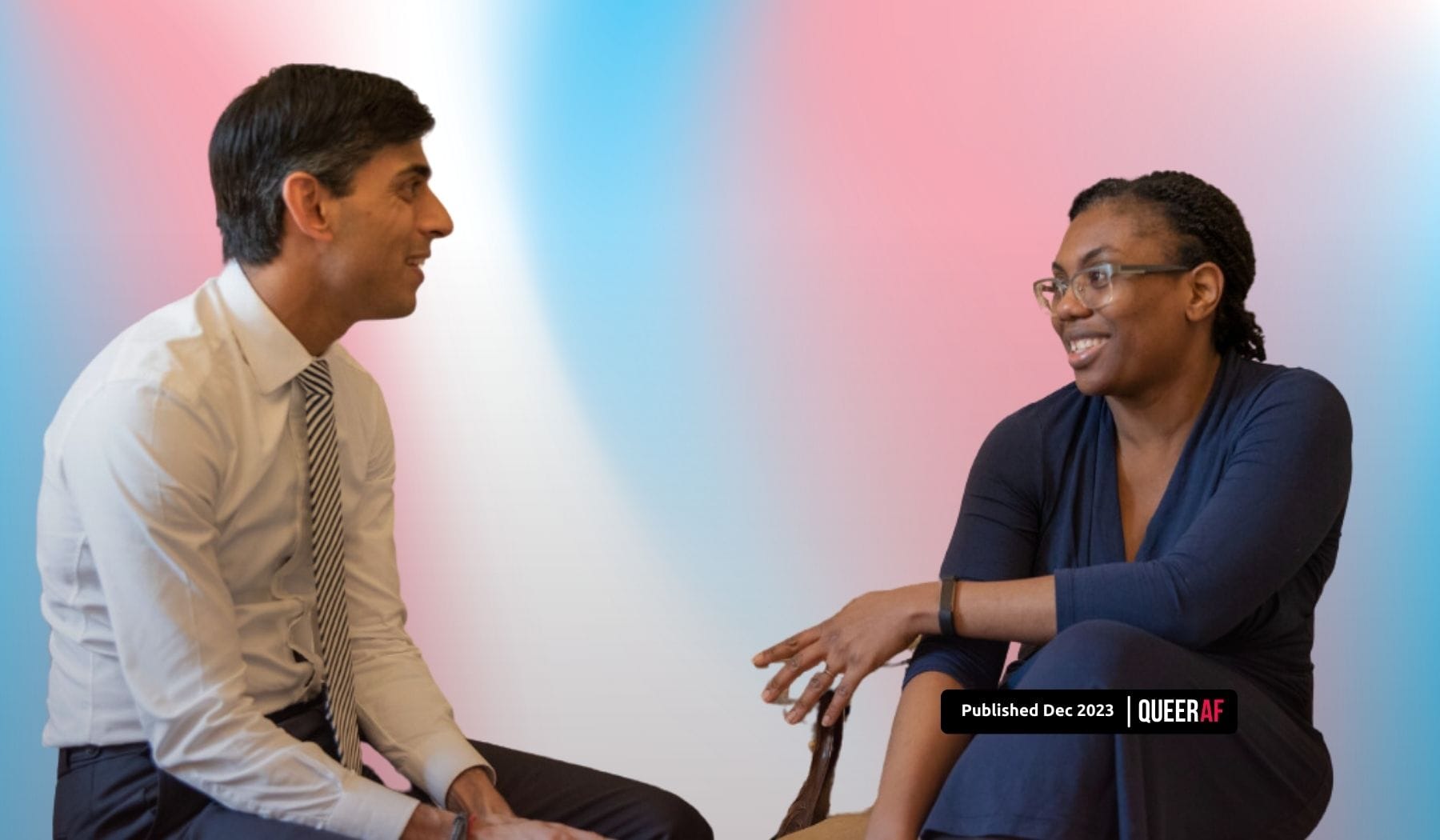TL;DR: Fresh off the heels of likening the rise in young trans people to an "epidemic", the 'Equalities' Minister was grilled in a Parliamentary committee this week. She said the long-promised ban on so-called 'conversion therapy' should only take place after a review into children's transgender healthcare, in case there are "interactions" between them.
Minister for Women and Equalities Kemi Badenoch told the Women and Equalities Committee this week that the ban on so-called 'conversion therapy' would have happened long ago if it wasn't for the "complicated" inclusion of transgender people in the bill.
Badenoch also said she wants the Cass Review - which is looking into gender identity services for children - to be published before any bill on so called 'conversion therapy' is finalised - the i, via X
The Minister also put her weight behind the gender critical dog whistle that young people are facing a movement that wants to ‘trans away the gay'. Without giving evidence, she said that predators are "exploiting" laws made for transgender people.
What did Kemi Badenoch say about the 'Conversion Therapy' ban delay?
Badenoch said the ongoing five-year delay on banning the practice - which is internationally recognised as harmful and in some cases as a form of torture - was because of complications around how to include transgender people.
She said there were “issues” defining gender identity for the purposes of bringing in trans-inclusive legislation and making it both “well-defined” and “prosecutable” - PinkNews
"The T is what has made it very complicated. Gender identity and sexuality are wholly different. The fluidity with which people define gender identity, for instance people who say that they are non-binary, how do you define an identity that can change. How do you convert something [that is] in it, and of itself, fluid?” - Badenoch speaking to the committee
Analysis: Many LGBTQIA+ people would dispute this statement - particularly the idea that people can't face the malpractice of conversion on the basis of gender identity. The reality, as we cover in our Long Read section today, is that the 'conversion' that takes place for trans people is from how people identify their gender, forcing them to match the stereotypes linked to their sex assigned at birth.
Kemi Badenoch said, without evidence, "sexual predators" were "exploiting" laws made for trans people
Using emotional language in what senior Guardian politics correspondent Peter Walker described as "the worst-tempered committee hearing I've ever seen", Badenoch said:
- That gender clinics have seen an “explosion” in referrals in recent years and that is why they are unable to cope and have extremely long waiting lists.
- That she never called the rise of young people identifying as trans an “epidemic”, instead repeating that she said “almost an epidemic”.
- That vulnerable autistic and gay young people were being put on a 'irreversible medical pathway'.
- That sexual predators were "exploiting" laws made for trans people - though she didn't cite any evidence for this claim.
The minister was also rebuked for using "unparliamentary" language when she accused committee chairperson Caroline Noakes of lying. This is what the Minister for Equalities said last week in parliament:
I'm not alone in thinking the comments that the 'Equalities Minister' made likening a rise in young transpeople to an "epidemic" are egregious.
— Jamie Wareham (@jamie_wareham) December 11, 2023
But her packed comments statement signalled far more hateful policy to come in Schools - unpacked i 🧵👇pic.twitter.com/Z9XcbmTlXJ https://t.co/oAH2UTMeEl
Analysis: What's the difference between 'almost' and 'is' an epidemic?
Badenoch has been practising her gaslighting. She uses a qualifier like 'almost' while using the emotionally charged word 'epidemic', so she can later deny she called it an epidemic while still having the intended impact. It’s a tactic straight out of Donald Trump’s playbook.
In fact, it’s a well-established tactic among fascist politicians to loudly accuse other people of lying while they themselves are lying. They will say anything, using language designed to divide, distract and confuse to get their way.
Sophie Perry, LGBTQ+ Journalism Network founder and QueerAF contributor, watched Badenoch's appearance and told us it was all “deeply unsettling”:
“The minister’s heated denials over the semantics of her language – and whether the word ‘epidemic’ relates to ‘disease’ – speaks to a wider narrative rife in UK politics that words simply don’t matter when it comes to the favourite political football of the moment: trans folk.
“As this meeting demonstrates, a Tory minister can describe a minority as an almost epidemic and brush it off as not the same as saying they are an epidemic. In both cases, however, the definition and impact of the phrase remains the same.
Perry added that, given the emotional language used in this public meeting, it’s even more concerning to think about how LGBTQIA+ lives are being talked about behind closed doors within government.
Following last week’s egregious comments and this week's semi-denial over them, a pattern is emerging from the Minister. One that is designed to dismantle any support for progressive transgender reform.

What do you know about 2024?
- You know it's not enough for you alone to understand the LGBTQIA+ world - we need everyone to.
- You want to play your part in helping to change the media - so it can shift the narrative on queer lives positively.
- You believe in a different kind of queer news - focused on creating content because it counts for the community, not for clicks.
- You want to join a community of like-minded queers dedicated to supporting marginalised LGBTQIA+ people - who want to make the world better place.
QueerAF is a growing community of members who want to change the media by supporting LGBTQIA+ creatives' careers.
Every membership helps fund our unique approach to queer journalism, as well as our wider work shifting the media landscape so it works for us, not against us.
Make your new years resolution clear:











